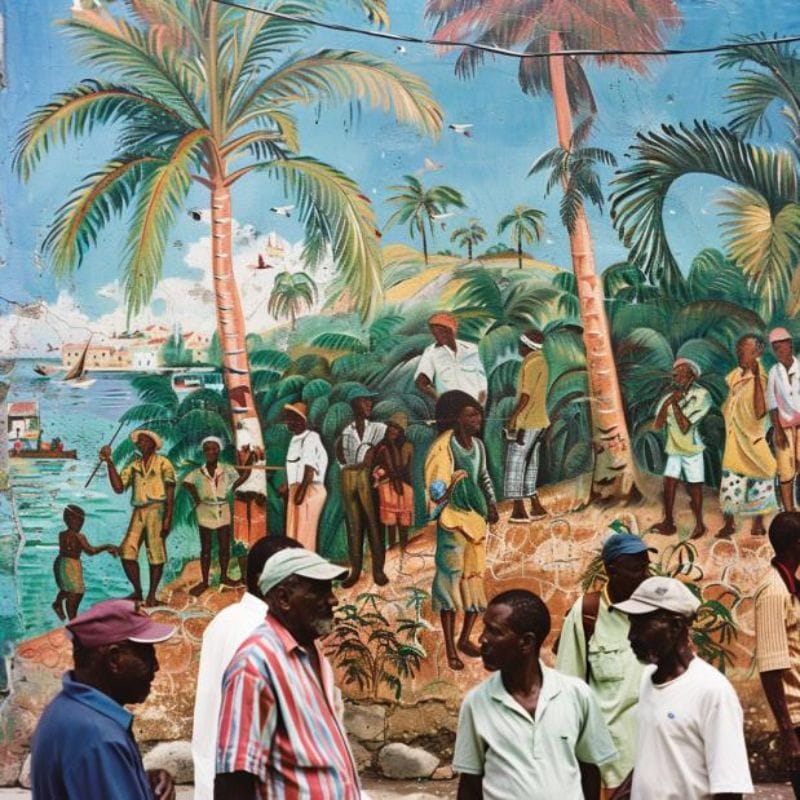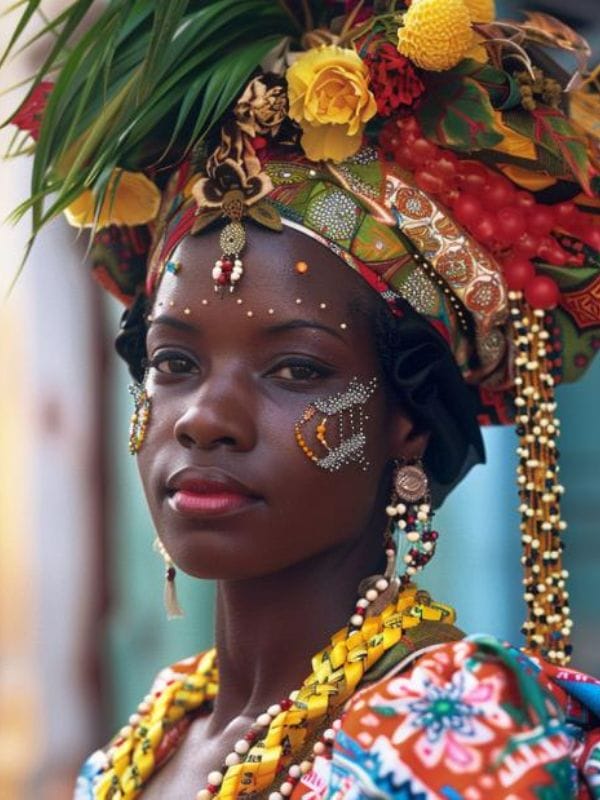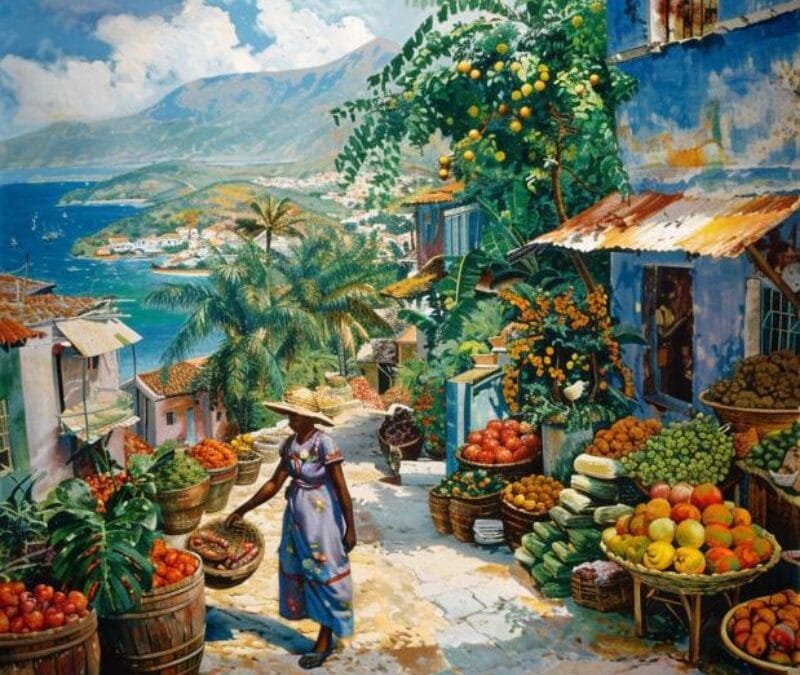Haitian proverbs, steeped in Haiti's rich cultural tapestry, offer timeless wisdom and insight into the complexities of life. These succinct expressions, handed down from generation to generation, encapsulate the essence of Haitian culture, reflecting its resilience, spirituality and collective wisdom. From rural villages to bustling city streets, Haitian proverbs serve as guiding principles, imparting valuable lessons about love, family, perseverance and community.
In this exploration of haitian proverbs, we set out to discover the profound and universal truths contained in these succinct and poetic sentences.
- “Pa gen chen san zo.” » – There is no dog without fleas. This proverb means that every person or thing has flaws or problems.
- “Dèyè mòn gen mòn. » – Behind the mountains, there are other mountains. This proverb means that there are always challenges to overcome in life.
- “Sa ki nan vant ou, se li ki pou bay ou dife. » – What's in your belly is what can burn you. This proverb means that secrets can cause problems if you don't keep them to yourself.
- “Bouch granmoun se lanmò li ye. » – Meaning: The mouth of an adult is their death. This proverb means that one should think before speaking, as words can have serious consequences.
- “Lè w konn ou pa nan twou. » – Meaning: If you know, you're not in the hole. This proverb means that education is the key to success.
- “Piti piti, zwazo fè nich. » – Meaning: Little by little, the bird builds its nest. This proverb means that by working slowly but surely, one can achieve their goals.

- “Sak vid pa kanpe. » – An empty bag won't stand upright. This proverb means that to succeed, you must have the necessary resources.
- “Chak jou pa menm. » – Every day is different. This proverb means to enjoy each day as if it were unique.
- Meaning: Every day is not the same. This proverb means that one should sixteen each day as if it were unique.
- “Moun ki pa konn dwa li, se malè li konn. » – He who does not know his rights knows only bad luck. This proverb means that it's important to know your rights and claim them.

- “Lè bondye vle, tout bagay posib. » – When God wills, anything is possible. This proverb means that faith and self-confidence are key to achieving your goals.
- “Bèl fanm se chay ki gen zòrèy. » – A beautiful woman is a burden with ears. This proverb means that a beautiful woman often faces jealousy and gossip.
- “Tonbe pitit se kouri pou l ale. » – Falling down is the running to go. This proverb means that when someone falls, they must get up and keep moving forward.
- “Bèl dan pa di zanmi. » – Beautiful teeth don't indicate friendship. This proverb means that appearances can be disappointing.
- “Dan Grennen pa janm manje kòk. » – Strong teeth never eat porridge. This proverb means that those who are capable never struggle.
- “Bouyi chat pa janm twò cho. » – A boiling pot is never too hot for a cat. This proverb means that one adapts to difficult situations.

- “Chen genyen twòp bagay nan ke li. » – A dog has many things in its belly. This proverb means that someone who knows too much can be dangerous.
- “De twòp stiff twòp foure. » – Two stiff objects cause friction. This proverb means that conflict arises when people are too similar.
- “De pye pa wete rasin. » – Two feet cannot remove roots. This proverb means that some problems are deeply ingrained and cannot be easily solved.
- “Dlo ap fòse w’ap mache. » – Water will force you to walk. This proverb means that necessity drives people to action.
- “Konnen kokenn, konnen res. » – Knowing one, knows the rest. This proverb means that understanding one aspect of something reveals the rest.
- “Kouto pa janm koupe dlo. » – A knife never cuts water. This proverb means that certain things are impossible or ineffective.
- “Lakay se lakay. » – Home is home. This proverb means that no matter where you go, home is where you belong.

- “Lè neg ap dechennen sou wòch, li pa genyen. » – When a man pisses on a stone, he doesn't win. This proverb means that some efforts are futile.
- “Mare pa lage. » – Tying is not loosening. This proverb means that once committed, it's challenging to reverse course.
- “Nan pòch mò, yo wete kwit. » – In a dead man's pocket, they take away the quid. This proverb means that once someone is gone, their possessions no longer matter.
- “Nou gen dwa pou nou pale. » – We have the right to speak. This proverb means that everyone has the right to express themselves.
- “Ou wè sa ou genyen, ou pa wè sa ou pedi. » – You see what you have, you don’t see what you lose. This proverb means that people often focus on what they have rather than what they lack.
- “Pa kouri devan wòch lou. » – Don't run in front of a heavy stone. This proverb means that it's unwise to confront an inevitable obstacle head-on.
- “Pa gen fòt san presidan. » – There is no crime without a president. This proverb means that leaders bear responsibility for the state of their nation.
- “Pale franse, mache sòti. » – Speak French, walk out. This proverb means that one must match their words with actions.
- “Wòch nan dlo pa konnen mizè dlo. » – A stone in the water does not know the misery of the water. This proverb means that those who are comfortable do not understand the struggles of others.

In conclusion, Haitian proverbs are poignant reminders of the resilience, wisdom and spirit of the Haitian people. In their simplicity and depth, these proverbs transcend borders, offering insight and inspiration to individuals from all walks of life.
By reflecting on the wisdom contained in these age-old sayings, we gain a deeper appreciation of the richness of Haitian culture and the enduring power of storytelling to illuminate human experience.
See also our article: The history and profound meaning of the Haitian flag: Symbol of freedom, struggle and national pride










